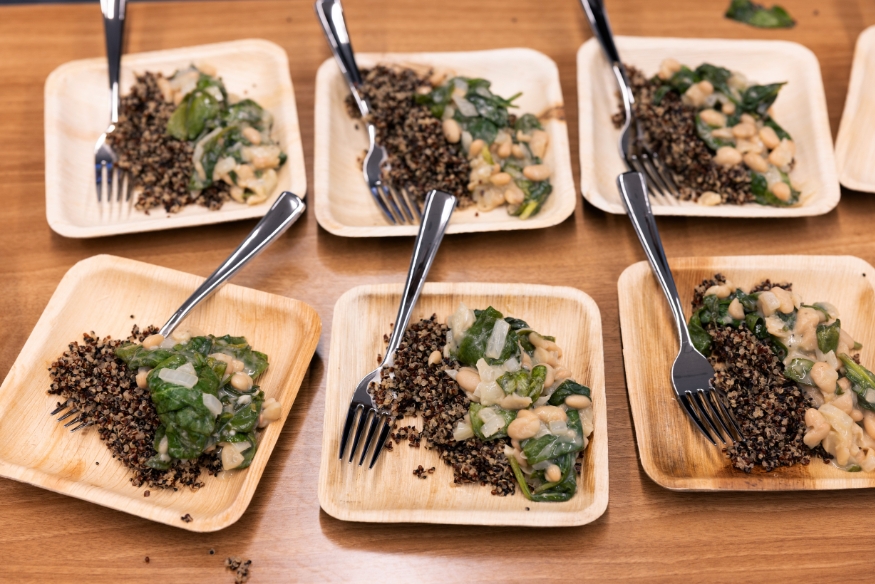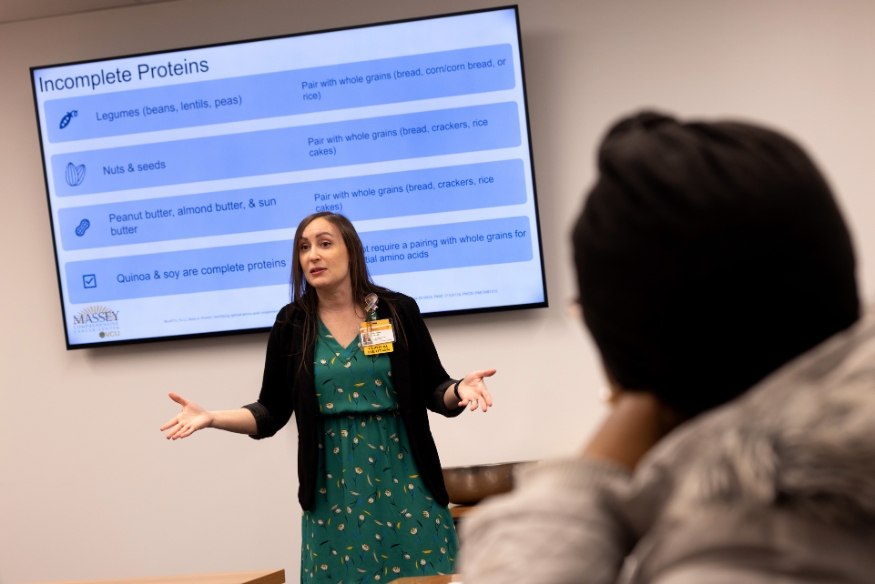Latest News
Prevention
Teaching patients why food is medicine
Aug 20, 2025
 Samples from a nutrition and cooking class offered by VCU Massey Comprehensive Cancer Center’s In Cancer Care, Food is Medicine program. (Photos by: Daniel Sangjib Min, MCV Foundation)
Samples from a nutrition and cooking class offered by VCU Massey Comprehensive Cancer Center’s In Cancer Care, Food is Medicine program. (Photos by: Daniel Sangjib Min, MCV Foundation)
The tofu veggie stir fry was a new culinary experience for some of the patients sitting before Samantha Haswell, R.D., an integrative health dietitian and outpatient oncology dietitian with VCU Massey Comprehensive Care Center.
As she talked about tofu’s benefits as a plant-based source of protein and how its neutral flavor easily absorbs sauces of any kind, she watched about a dozen people size up the dishes in front of them. Some dove in eagerly while others picked gingerly at a bell pepper or piece of broccoli.
Expectedly, the reactions were mixed, from surprised delight to less than enthusiastic. Haswell leads nutrition and cooking classes called In Cancer Care, Food is Medicine, which provide reliable, research-based nutritional information, kitchen tools and fresh food. It also provides grocery store gift cards to patients who have identified as not having enough to eat or knowing where their next meal will come from.
“During cancer treatment, nutrition is very different, and if someone is food insecure, it also means they’re more likely to have malnutrition,” Haswell said.
 Samantha Haswell, R.D., an integrative health dietician and outpatient oncology dietitian at Massey, leads a cooking class through the Food is Medicine program.
Samantha Haswell, R.D., an integrative health dietician and outpatient oncology dietitian at Massey, leads a cooking class through the Food is Medicine program.
Food impacts cancer’s symptoms, and for many patients, particularly those from vulnerable populations, nutrition is not a priority when navigating treatment.
“A lot of times, nutrition goes out the window because the body is in survival mode,” Haswell said. “The priority here at Massey becomes making sure patients are eating enough protein and keeping their weight stable so they can get through treatment and move into survivorship.”
Making the connection between cancer and nutrition is the first step. Food is Medicine class topics differ weekly and include education on everything from dietary fats and heart health to fruits and vegetables and how dietary fiber impacts cancer risks. During the class where tofu made an appearance, Haswell explained that cancer changes many patients’ relationships with food — a point that was emphatically supported by class participants.
Some spoke of only being able to taste sour foods. Others shared that they lost the ability to love their favorite foods, like chocolate.
“We try to help patients adapt their favorite foods, so they taste better, and patients will want to eat and get the nutrients they need,” Haswell said.
Suggestions ranged from adding bright, acidic elements like lemon or lime juice to enhance flavors, or sweeteners to condiments like barbecue sauces.
Haswell said Food is Medicine also helps patients wade through the increasing amount of misinformation that exists regarding the connection between nutrition and cancer.
“We get a lot of questions from patients about things that they hear, like online influencers who say, for example, that cayenne pepper cures cancer,” Haswell said. “We want to answer their questions with evidence-based research, so they don’t do things that are actually harmful.”
Food is Medicine typically offers four weeks of cooking and nutrition classes that provide survivors and their caregivers with options for healthy dishes that won’t break their budget. In some classes, participants receive kitchen tools they can use to re-create the meals at home.
“We show them simple recipes, and we don’t add tons of spices or ingredients that aren’t cost-effective,” she said.
Food used in the cooking demonstrations, performed by VCU Dining Services chefs, complement the emergency food boxes some class participants receive. The boxes, which are provided by Feed More, typically contain a variety of non-perishable goods like brown rice or heart-healthy beans.
“We don’t choose ingredients that are super fancy,” Haswell said. “Ingredients like onions and garlic and spinach aren’t crazy expensive and offer lots of health benefits and flavor.”
Cancer upends lives, Haswell said. But nutrition is one thing that patients can control if they have access to the right tools and information.
“Being able to talk to a dietitian and be part of a program like Food is Medicine allows patients to have more control over what’s happening in their lives, especially as they go into survivorship,” she said. “Our goal is to get patients to a point where they feel ready to start cooking so they can benefit from that cancer prevention and survivorship diet.”
Written by: Holly Prestidge, MCV Foundation
Related News
Research & Innovation, Prevention
VCU Massey Comprehensive Cancer Center joins leading cancer research centers to reinforce importance of HPV vaccination to prevent cancerSep 25, 2025

Get access to new, innovative care
Treatments in clinical trials may be more effective or have fewer side effects than the treatments that are currently available. With more than 200 studies for multiple types of cancers and cancer prevention, Massey supports a wide array of clinical trials.

Find a provider
Massey supports hundreds of top cancer specialists serving the needs of our patients. Massey’s medical team provides a wealth of expertise in cancer diagnosis, treatment, prevention and symptom management.
